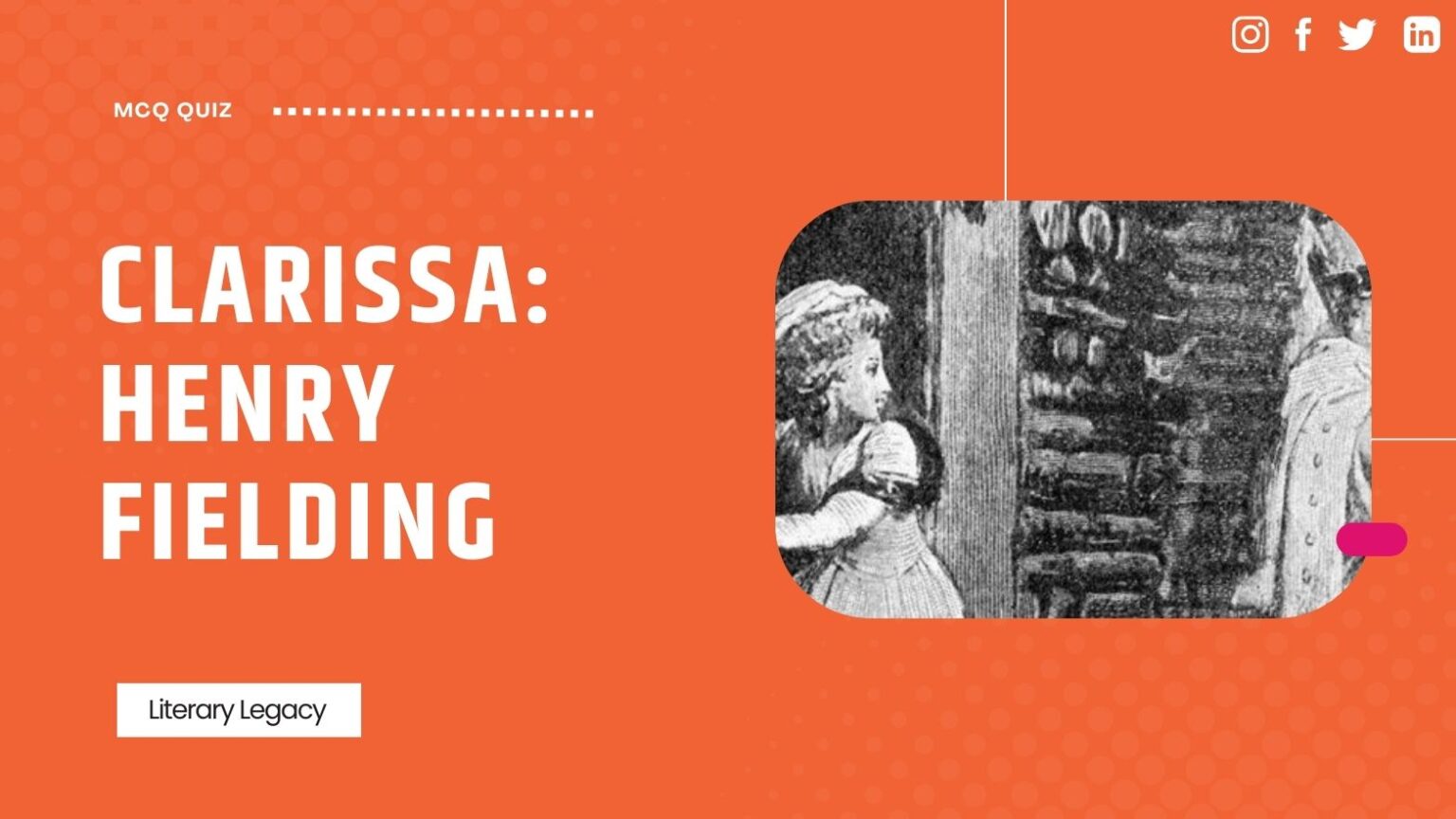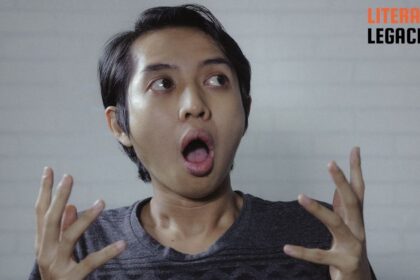1. What characteristic best describes Robert Lovelace’s attitude toward Clarissa?
A) He is indifferent to her feelings and aspirations.
B) He admires her virtue as a challenge to conquer.
C) He views her solely as a source of wealth.
D) He respects her independence and desires.
Answer: (B)
He admires her virtue as a challenge to conquer.
Lovelace admires Clarissa’s virtue, which instigates him to seduce her as a challenge.
2. How does Clarissa’s relationship with her mother, Mrs. Harlowe, primarily manifest?
A) Mrs. Harlowe openly defies her husband for Clarissa’s sake.
B) Mrs. Harlowe is resentful of Clarissa but loves her passively.
C) Mrs. Harlowe constantly encourages Clarissa to follow her heart.
D) Mrs. Harlowe supports Clarissa against Mr. Harlowe’s wishes.
Answer: (B)
Mrs. Harlowe is resentful of Clarissa but loves her passively.
Mrs. Harlowe loves Clarissa but fails to actively support her due to her passive nature
3. Which statement about John Belford is true?
A) He seeks to manipulate Clarissa for personal gain.
B) He corresponds with Lovelace using a secret shorthand.
C) He entirely rejects his libertine lifestyle after meeting Clarissa.
D) He harbors no conscience about his actions with women.
Answer: (B)
He corresponds with Lovelace using a secret shorthand.
Belford has a habit of correspondence with Lovelace using a unique shorthand.
4. What role does Mrs. Sinclair play in relation to Clarissa?
A) She acts as a nurturing guardian who protects Clarissa.
B) She disguises herself as a friend to gain Clarissa’s trust.
C) She is a repulsive madam who contributes to Clarissa’s ruin.
D) She is a maternal figure wishing to help Clarissa escape.
Answer: (C)
She is a repulsive madam who contributes to Clarissa’s ruin.
Mrs. Sinclair is instrumental in the decline of Clarissa’s virtue and well-being.
5. How does Clarissa perceive her sister Arabella?
A) As a supportive ally in her struggles.
B) As a bitter individual who is critical of her.
C) As someone she admires for their ambition.
D) As a rival whose jealousy she does not understand.
Answer: (B)
As a bitter individual who is critical of her.
Clarissa views Arabella with disdain due to her envy and harsh demeanor.
6. What best describes Mr. Harlowe’s personality?
A) He is lenient and allows his children to make their own decisions.
B) He is authoritarian and concerned with family reputation.
C) He values individuality and personal freedom.
D) He is forgiving and nurturing towards his children.
Answer: (B)
He is authoritarian and concerned with family reputation.
Mr. Harlowe is unforgiving and has strict expectations regarding family honor.
7. What is a main aspect of Anna Howe’s character?
A) She is vivacious but sometimes cruel towards others.
B) She is serious and always considers her actions.
C) She is overly self-critical and lacks confidence.
D) She effortlessly maintains peace among her friends.
Answer: (A)
She is vivacious but sometimes cruel towards others.
Anna is known for her lively personality but can be offensive and cruel.
8. Which character serves as a significant foil to Clarissa?
A) Mrs. Harlowe
B) Robert Lovelace
C) Anna Howe
D) James Harlowe, Jr.
Answer: (C)
Anna Howe
Anna Howe’s lively and flippant nature contrasts sharply with Clarissa’s seriousness.
9. What does Clarissa feel about the prospect of marrying Roger Solmes?
A) She believes he would elevate her social standing.
B) She is repulsed by his character and intentions.
C) She is eager due to her love for him.
D) She is indifferent because of his wealth.
Answer: (B)
She is repulsed by his character and intentions.
Clarissa finds Roger Solmes to be an unappealing match, primarily due to his character.
10. Which character transitions from being Lovelace’s friend to siding with Clarissa?
A) John Belford
B) Colonel Morden
C) Mr. Hickman
D) James Harlowe, Jr.
Answer: (A)
John Belford
Belford’s exposure to Clarissa leads him to question Lovelace’s actions and support her.
11. What is the main reason Clarissa becomes a victim of her family’s actions?
A) Her family’s desire for social status leads to greed.
B) Clarissa’s rebellious nature causes family conflict.
C) Her family’s wealth isolates her from society.
D) Clarissa’s beauty attracts unwanted attention.
Answer: (A)
Her family’s desire for social status leads to greed.
Clarissa’s family’s ambition for greater social standing motivates their unscrupulous actions, which eventually lead to her tragedy.
12. How does Lovelace initially come into conflict with Clarissa’s family?
A) He refuses to marry Arabella.
B) He is attracted to Clarissa instead of Arabella.
C) He tries to blackmail the Harlowe family.
D) He challenges James to a duel over Clarissa.
Answer: (B)
He is attracted to Clarissa instead of Arabella.
Lovelace’s attraction to Clarissa instead of Arabella fuels the family’s conflict and jealousy.
13. What does Clarissa refuse to do in response to her family’s demands?
A) Marry Roger Solmes.
B) Run away with Lovelace.
C) Correspond with her friend Anna Howe.
D) Leave her home.
Answer: (A)
Marry Roger Solmes.
Clarissa’s strong moral principles compel her to reject the idea of marrying the contemptible Roger Solmes.
14. How does Lovelace manipulate Clarissa during their time together?
A) He threatens to expose her family’s secrets.
B) He convinces her to publicly announce their marriage.
C) He pretends to be in love with her.
D) He uses her fear of forced marriage to control her.
Answer: (D)
He uses her fear of forced marriage to control her.
Lovelace exploits Clarissa’s fear of being forced into marriage to persuade her to run away with him.
15. What is Lovelace’s ultimate goal in his relationship with Clarissa?
A) To marry her and gain her family’s approval.
B) To help her achieve independence.
C) To cohabit with her without marriage.
D) To expose her as an immoral woman.
Answer: (C)
To cohabit with her without marriage.
Lovelace desires to force Clarissa into cohabitation, subverting her morals rather than seeking a legitimate marriage.
16. What is Clarissa’s reaction to Lovelace’s manipulative tactics?
A) She decides to escape on her own.
B) She quickly sees through his plans and confronts him.
C) She blindly trusts him and follows his lead.
D) She seeks advice from her family.
Answer: (C)
She blindly trusts him and follows his lead.
Clarissa’s innocence and virtue prevent her from recognizing Lovelace’s manipulative nature.
17. What happens to Clarissa’s reputation as she becomes involved with Lovelace?
A) It deteriorates, leading to her family’s disownment.
B) It remains unchanged as her family protects her.
C) It becomes a subject of local gossip but not serious scandal.
D) It improves, gaining her more admirers.
Answer: (A)
It deteriorates, leading to her family’s disownment.
Clarissa’s association with Lovelace ultimately ruins her reputation and estranges her from her family.
18. Who does Clarissa continue to correspond with while resisting the family’s demands?
A) Her brother James.
B) Richard Lovelace.
C) Her best friend, Anna Howe.
D) Her cousin, Charles.
Answer: (C)
Her best friend, Anna Howe.
Despite her family’s restrictions, Clarissa maintains a secret correspondence with her close friend Anna Howe.
19. What significant characteristic does Clarissa maintain throughout her struggles?
A) Her dedication to wealth and social status.
B) Her ability to befriend those around her.
C) Her willingness to compromise for love.
D) Her strict moral beliefs and virtue.
Answer: (D)
Her strict moral beliefs and virtue.
Clarissa’s uncompromising adherence to her moral beliefs stands out, even in dire circumstances.
20. What motivates Lovelace’s actions towards Clarissa?
A) His interest in her family’s wealth.
B) His desire for revenge against her family.
C) His belief in women’s inferiority.
D) His infatuation with her and dislike of marriage.
Answer: (D)
His infatuation with her and dislike of marriage.
Lovelace’s complex feelings for Clarissa blend infatuation with his aversion to traditional marriage.
21. What motivates Lovelace’s initial intentions toward Clarissa?
A) Instigation from other women and his own wicked heart
B) A genuine wish to help her escape her situation
C) Love and admiration for Clarissa’s beauty
D) A desire for revenge against her family
Answer: (A)
Instigation from other women and his own wicked heart
Lovelace’s intentions are primarily influenced by the instigation of the other women and his own wicked desires.
22. How does Clarissa respond to the trauma of her situation after being raped?
A) She becomes angry and violent
B) She stops eating and prepares for death
C) She seeks vengeance against Lovelace
D) She confides in her family for help
Answer: (B)
She stops eating and prepares for death
After her traumatic experience, Clarissa’s mental state deteriorates, leading her to stop eating and prepare for death.
23. What is Clarissa’s view on marriage and her role as a wife?
A) Marriage is a career opportunity for women
B) It is a partnership where both have equal responsibility
C) Wives should be obedient and prioritize family interests over their own
D) It holds no significance and can be disregarded
Answer: (C)
Wives should be obedient and prioritize family interests over their own
Clarissa believes that marriage requires complete obedience from a wife and that her fate is tied to her husband’s character.
24. What is a key difference between Clarissa and Lovelace’s perspectives on marriage?
A) Clarissa sees marriage as a punishment, while Lovelace views it as a blessing
B) Clarissa values moral integrity in marriage, while Lovelace believes it is often a punishment
C) Both view marriage as insignificant in their lives
D) Lovelace takes marriage seriously, whereas Clarissa treats it lightly
Answer: (B)
Clarissa values moral integrity in marriage, while Lovelace believes it is often a punishment
Clarissa prioritizes moral integrity and the importance of marrying a good man, while Lovelace dismisses marriage as a potential punishment.
25. Why does Clarissa refuse to take legal action against her father regarding her estate?
A) She believes it would be a public disgrace to her family
B) She has no interest in the estate
C) She cannot afford to pursue legal action
D) She thinks the law would not favor her case
Answer: (A)
She believes it would be a public disgrace to her family
Clarissa believes taking legal action against her father would be improper and would shame her family.
26. What role does Lovelace’s friend Belford play in the story?
A) He mediates between Lovelace and Clarissa while protecting her
B) He supports Lovelace’s plans to manipulate Clarissa
C) He becomes romantically involved with Clarissa
D) He helps Clarissa escape from Lovelace
Answer: (A)
He mediates between Lovelace and Clarissa while protecting her
Belford acts as a protector for Clarissa, keeping Lovelace at bay while mediating their complicated interactions.
27. What underlying theme does the failure of the legal system represent in the narrative?
A) The triumph of justice over personal disputes
B) The limitation of law in matters of personal morality and ethics
C) The necessity for legal action in all societal issues
D) The effectiveness of the law in protecting women’s rights
Answer: (B)
The limitation of law in matters of personal morality and ethics
The text shows how legal systems often fail to address personal and ethical matters, particularly regarding Clarissa’s plight.
28. How does Clarissa perceive her family’s views on duty and obedience?
A) She prioritizes family values over her own self-interest
B) She believes they are outdated and irrelevant
C) They align perfectly with her personal beliefs
D) She finds them restrictive and disapproves of them
Answer: (A)
She prioritizes family values over her own self-interest
Clarissa’s values are deeply rooted in her family’s traditional views on duty, leading her to prioritize them over her personal interests.
29. What is Lovelace’s ultimate ambition regarding Clarissa after the rape incident?
A) To make her his servant
B) To continually undermine her virtue and control her
C) To seek revenge on her family through her
D) To gain her love and genuinely marry her
Answer: (B)
To continually undermine her virtue and control her
Despite initially considering marriage, Lovelace is primarily driven by a desire to undermine Clarissa’s virtue and exert control over her.
30. What narrative significance do legal metaphors hold in the story?
A) They serve to highlight Clarissa’s innocence and virtue under societal judgment
B) They illustrate the importance of law in personal relationships
C) They emphasize the necessity of court trials in all moral situations
D) They depict the complexity of legal contracts in marriage
Answer: (A)
They serve to highlight Clarissa’s innocence and virtue under societal judgment
Legal metaphors are significant as they represent society’s judgment of Clarissa’s actions and virtue, contrasting with her reality.
31. What motivates Clarissa to carry on a clandestine correspondence with Lovelace?
A) Her hope to manipulate Lovelace for her own gain.
B) Her wish to unite with Arabella.
C) Her rejection of family authority and control.
D) Her desire for wealth and status.
Answer: (C)
Her rejection of family authority and control.
Clarissa’s refusal to conform to her family’s demands leads her to pursue a secret relationship with Lovelace.
32. Which statement best characterizes the Harlowe family’s attitude towards Clarissa’s relationship with Lovelace?
A) They are indifferent and uninvolved in her personal life.
B) They fully support her decisions and freedom.
C) They view it as a means to improve their social standing.
D) They disapprove and seek to control her actions.
Answer: (D)
They disapprove and seek to control her actions.
The Harlowes are suspicious and actively try to restrict Clarissa’s connections, particularly with Lovelace.
33. What aspect of Lovelace’s character is highlighted through his actions towards Clarissa?
A) His open admiration and genuine love for her.
B) His desire to form a traditional marriage bond.
C) His motivation to uplift her social status.
D) His enjoyment in manipulating and testing her virtue.
Answer: (D)
His enjoyment in manipulating and testing her virtue.
Lovelace enjoys putting Clarissa’s virtue to the test while manipulating her circumstances.
34. What is the primary reason Clarissa consistently refuses to marry Roger Solmes
A) She holds strong to her own principles and values.
B) She is in love with someone else.
C) She believes he is not wealthy enough.
D) She does not want to betray her family’s wishes.
Answer: (A)
She holds strong to her own principles and values.
Clarissa’s strong adherence to her moral principles prevents her from accepting a marriage to Solmes.
35. What role does family greed play in the story of Clarissa’s fate?
A) It leads to her isolation and manipulation.
B) It causes Clarissa to seek revenge.
C) It provides Clarissa with unconditional support.
D) It encourages a strong bond among family members.
Answer: (A)
It leads to her isolation and manipulation.
The greed of the Harlowe family drives their actions against Clarissa, contributing to her tragic fate.
36. How does Lovelace perceive marriage in contrast to his interactions with Clarissa
A) As a necessary institution for stability.
B) As a means to gain social respectability.
C) As an outdated concept not fit for his ideals.
D) As a trap he aims to avoid.
Answer: (D)
As a trap he aims to avoid.
Lovelace is enamored with Clarissa but detests the idea of marriage, instead seeking cohabitation.
37. What does Clarissa’s refusal to compromise her morals ultimately lead to in her relationship with Lovelace?
A) An enduring partnership.
B) A successful marriage proposal.
C) Her family’s restored trust.
D) Her tragic downfall and loss of reputation.
Answer: (D)
Her tragic downfall and loss of reputation.
Clarissa’s adherence to her strict morals results in tragic consequences, including her ruined reputation.
38. What is the consequence of Clarissa’s trust in Lovelace’s intentions?
A) It places her in a vulnerable situation.
B) It leads her to make empowering .
C) It fosters a loving and respectful partnership.
D) It strengthens her relationship with her family.
Answer: (A)
It places her in a vulnerable situation.
Clarissa’s naivety and trust in Lovelace’s facade ultimately leave her vulnerable to manipulation.
39. What significant realization does Lovelace test in Clarissa throughout their interactions?
A) Her willingness to accept wealth over love.
B) Her ability to forgive easily.
C) Her desire to conform to societal norms.
D) Her strength in maintaining her virtue.
Answer: (D)
Her strength in maintaining her virtue.
Lovelace seeks to test Clarissa’s virtue, attempting to compel her to compromise her strict morals.
40. What does Lovelace’s manipulation of Clarissa reveal about his character?
A) He enjoys exerting control over women.
B) He is primarily interested in her financial worth.
C) He seeks to marry her out of love.
D) He is genuinely concerned for her wellbeing.
Answer: (A)
He enjoys exerting control over women.
Lovelace takes pleasure in controlling and manipulating Clarissa, demonstrating his manipulative nature.



